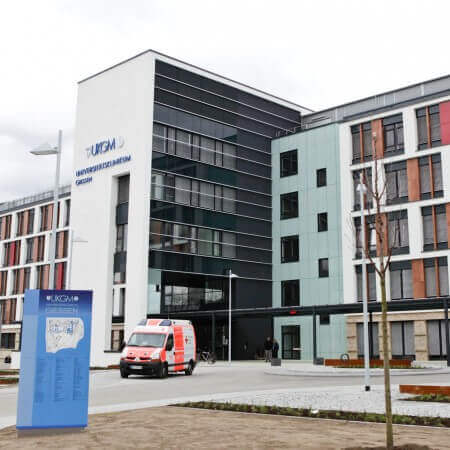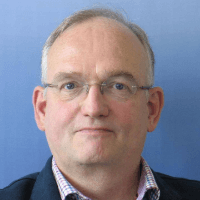Brain Tumor — Proton Therapy: treatment in the Best Hospitals of Germany
Treatment prices are regulated by national law of the corresponding countries, but can also include additional hospital coefficients. In order to receive the individual cost calculation, please send us the request and medical records.

Department of Adult and Pediatric Proton Therapy
The Department of Adult and Pediatric Proton Therapy offers the full range of proton treatment and it is one of the leading and most progressive medical facilities of this kind not only in Germany, but throughout the world. The proton therapy is mostly used for the treatment of tumors of the eye, brain, spine and pelvic organs. Also, the proton therapy is an excellent treatment of tumors in children, since it has a minimal negative effect on the immature, sensitive tissues of the child’s body.







National Center for Tumor Diseases (NCT) Heidelberg
The National Center for Tumor Diseases (NCT) Heidelberg offers the full range of diagnostics and treatment of various oncological diseases. Since its foundation in 2004, the center has gained a reputation of one of the leading in Germany. The center is supported by the German Cancer Research Center (DKFZ) and the German Cancer Aid (Deutschen Krebshilfe). The center treats about 60,000 patients from 45 countries every year. Thanks to the outstanding research activities, the department has the very latest therapeutic opportunities that save lives for thousands of people.


Proton Therapy Center
The Proton Therapy Center specializes in an innovative type of radiation therapy for children, namely proton therapy. The medical facility is one of four centers in Germany offering proton therapy for cancer treatment in young patients. The center has been working since October 2015 in close cooperation with the Marburg Ion Beam Therapy Center and today can boast exceptional clinical experience in the field of its competence. Proton therapy is significantly superior to conventional radiation therapy in terms of dose control, dose distribution and side effect profile. Thus, it is an excellent alternative form of cancer treatment. The main advantage of proton therapy is that it has potentially fewer immediate and long-term side effects as compared to classical radiation therapy. The harmful effects on healthy tissues during proton therapy are minimized, which is especially important for children, as their brain and body are in the growth phase. In addition, proton therapy is provided on an outpatient basis and is an absolutely painless treatment, which is also important for young patients.

Very often, brain tumor treatment requires an integrated approach involving specialists in the field of radiation therapy and/or chemotherapy. Modern radiotherapy technology allows irradiation with high precision and the presence of proton emitters makes it possible to avoid damage to healthy tissues near the tumor. This factor is of great importance for brain tumor treatment.
Brain tumor overview
Brain cancer is a group of intracranial formations arising from the tissues of the brain and cranial nerves or as a result of the spread of metastases of tumors of different organs. Like most other cancers at the early stages, this tumor does not cause symptoms. Brain cancer can be suspected only by minor pains, sleep disturbances, and constant fatigue.
The term "brain tumor" includes neoplasms that are different in origin, clinical manifestations, prognosis, and treatment approaches.
Concerning the brain, all intracranial formations are subdivided into intracerebral (originating from brain cells) and extracerebral (developing from the membranes of the brain, cranial nerves, skull bones, etc.) ones. By origin, brain tumors are divided into primary, that is, those arising directly in the brain or adjacent structures, and secondary, or metastatic, occurrence of which is associated with the spread of cancer cells from tumors of other localizations.
Types of brain tumors
- Low-grade astrocytomas.
Since these tumors infiltrate normal brain tissue, they cannot be cured with surgery. After the maximum removal of the tumor, radiotherapy is performed. However, irradiation in such patients is less effective than in patients with high-grade astrocytomas.
- High-grade astrocytomas.
These types of astrocytomas are also not curable by surgery. After the maximum removal of the tumor, radiotherapy is performed, followed by chemotherapy.
- Lymphomas.
These tumors are not treated with surgery, as they tend to spread widely throughout the brain. The role of surgery is only a biopsy – taking a piece of tissue that is suspected of being malignant for microscopic examination. Radiotherapy is the standard treatment for lymphomas of the brain and spinal cord. Chemotherapy can also have beneficial effects. An exception is made for patients with lymphoma in combination with AIDS.
The use of radiation therapy in combination with chemotherapy often leads to long-term improvement (remission). When tumor cells are found in the cerebrospinal fluid, anticancer drugs are injected into the spinal canal.
- Medulloblastomas.
Medulloblastomas are cerebellar tumors that account for 30-40% of all brain tumors in children. Medulloblastoma is considered one of the most malignant brain tumors in children. New methods of treatment and diagnosis of patients have significantly improved the prognosis. However, an optimal algorithm for the treatment of this disease has not been developed yet.
Treatment of patients with medulloblastomas currently consists of three stages: surgical removal of the tumor and restoration of normal cerebrospinal fluid circulation, radiotherapy, and chemotherapy.
Complex therapy begins with the removal of the tumor. With timely complex treatment, the 5-year survival rate of patients with medulloblastomas is 70-80%.
Symptoms
There are no specific symptoms for detecting a particular neoplasm of the brain. However, there are general signs that allow one to suspect the development of a benign or malignant brain tumor. If you notice them, you should not hesitate to visit a doctor: firstly, because the severity of the disease will increase over time, and secondly, because modern medicine has excellent tools for painless brain tumor treatment.
Since the formation is located inside the skull, its growth is invisible, but it is usually not difficult to notice neurological disorders. The doctor diagnoses the tumor based on the patient's complaints, neurological examination, and using the information from magnetic resonance imaging. Some inherited disorders (neurofibromatosis, tuberous sclerosis) can significantly increase the risk of brain tumors development, in particular the development of schwannomas and meningiomas. The information about the influence of other factors, such as the frequency of using a cell phone, is widely discussed but has not been proven in large clinical trials.
The most common symptom, experienced by half of the patients with brain tumors, is prolonged headache. Every day it becomes more and more severe and reaches its greatest intensity at night and in the hours before awakening. The pain may worsen with coughing and physical activity and may be accompanied by vomiting.
Convulsions are also a common symptom. Moreover, they come suddenly, and after them there is a heaviness in the head, soreness in the muscles, and drowsiness. If brain tumor treatment is postponed, the patient may fall into a coma.
Visual impairment can be very diverse: bright flashes appear in the field of view, the image doubles, becomes foggy, or its clarity can suddenly be lost.
The information from clinical trials shows that brain tumor patients suffer from depression and a loss of interest in the things they used to do with passion. It is also worth paying attention to memory impairment. This symptom becomes especially noticeable when it becomes impossible to remember recent events. Loss of concentration is also quite a clear symptom. If a person cannot plan and cope with more than one of the daily or the professional tasks that were easily managed before, a doctor's consultation is necessary.
Diagnostics
Brain cancer diagnostics in Germany is carried out with the following methods:
- Neurological examination. The physician evaluates eye movement, coordination, sensitivity, memory, and concentration.
- Magnetic resonance imaging. In this case, clear three-dimensional images are obtained, with the help of which very small tumors can be detected, even if they are located near bones. The MRI is also used during surgery for assessing the accuracy and response to treatment.
- CT scan. It helps to determine the location of the tumor, the presence of cerebral edema, or hemorrhage.
- Positron emission tomography. It makes it possible to analyze the activity of the brain, detect the emerging tumor cells, and assess the stage of cancer.
- Lumbar puncture. The cerebrospinal fluid is checked for the presence of tumor cells or tumor markers.
- Biopsy. With the help of harvesting tissue sample from a tumor area, it is possible to determine its malignancy and type.
All information can be obtained only with the help of high-precision and modern methods. In Germany, which is righteously considered the technological leader in Europe, the most progressive methods are used for examining patients.
Proton therapy for brain tumor treatment
Brain tumor treatment in Germany begins with diagnostics using specialized equipment, which makes it possible to detect a tumor in the absence of significant manifestations.
German doctors study the brain in detail to detect the primary location of the tumor because most often brain cancer is caused by metastases from other organs. Germany ranks first in the number of successful brain tumor treatments. Also, relapses after treatment are very rare here. Treatment of brain tumors in Germany is at this level due to the high qualification of specialists and the availability of high-precision equipment.
Brain tumors require precise treatment and care due to their location and proximity to critical structures of the nervous system. With proton therapy for a brain tumor, the world-class team delivers radiation at precise depths to target brain tumors with a more powerful and accurate dose.
While standard radiotherapy releases the maximum dose of radiation as soon as it penetrates the skin and continues to emit radiation as it travels to the tumor, proton therapy reduces the radiation exposure to unaffected surrounding brain tissues by up to 50%.
With less radiation exposure to healthy brain, eye, and optic nerves, patients treated with proton radiotherapy experience fewer side effects compared to the standard X-ray radiotherapy. Proton radiotherapy provides significantly less radiation to the brain stem, eyes, and healthy tissue compared to X-rays radiotherapy.
Advantages of proton therapy for brain tumor treatment include:
- Reducing the risk of side effects development such as vision or hearing loss, cognitive or motor impairment, and neurological or hormonal disorders
- Reducing the risk of recurrent and secondary cancer
- High precision allows treating the most complex irregular-shaped tumors more accurately
- It can be used in combination with the conventional radiotherapy, chemotherapy, hormone therapy, and a follow-up surgery
- Patients can maintain high quality of life during and after treatment
- The FDA (Food and Drug Administration) approved proton therapy for brain tumor treatment
Brain tumors that are most suitable for proton therapy are as follows:
- Gliomas (astrocytomas)
- Ependymomas
- Medulloblastomas
- Germ cell tumors of the brain
- Pituitary tumors
- Brain tumours proton therapy in children
Arteriovenous malformations of the brain can also be treated with proton therapy.
Where can I undergo proton therapy in Germany?
Health tourism is becoming more and more popular these days, as treatment abroad often ensures a much better quality of proton beam therapy.
The best success rates in proton beam therapy in Germany show:
- University Hospital Essen
- University Hospital Heidelberg
Regarding the accommodation during the treatment in the University Hospital Essen, patients live in the most comfortable rooms that include automatically adjustable bed, bedside table, personal wardrobe, personal call button, telephone, TV, internet, and radio. As for the accompanying person, who may want to stay near the hospital, the hotel of the Essen University Hospital offers accommodation as well.
The University Hospital Heidelberg provides accommodation options that include single and double rooms with all necessary furniture, personal wardrobe, personal bathroom, TV, and internet.
For accompanying persons, the accommodation options of staying with the patient in the room or in the hotel are available during the inpatient program. During the outpatient treatment, the patient may live in the hotel of choice.
You can find more information about the hospitals and the services they provide on the Booking Health website. The managers will provide all the necessary information about accommodation options of hospitals and will help you pick the most suitable one.
The cost of treatment in Germany
The prices in hospitals listed on the Booking Health website are relatively low. With Booking Health, you can undergo proton therapy in Germany at an affordable price.
The cost for proton therapy treatment varies, as the prices depend on hospitals, the specifics of the disease, and the complexity of its treatment.
The average cost for proton therapy treatment in Germany is 75,000 EUR, while brain cancer treatment costs 80,670 EUR, proton therapy for prostate cancer treatment costs 80,414 EUR, and proton therapy for lung cancer treatment costs 80,495 EUR.
You also need to consider the costs of additional procedures and follow-up care. Therefore, the ultimate cost of treatment in Germany may differ from the initial price.
To receive the information on the cost for proton therapy treatment and the overall cost of treatment in Germany, contact us by leaving the request on the Booking Health website.
How can I undergo proton therapy for brain tumor treatment in Germany?
It is not easy to self-organize any treatment abroad. It requires certain knowledge and expertise. Thus, it is safer, easier, and less stressful to shift some responsibility onto a medical tourism agency.
As the largest and most transparent medical tourism agency in the world, Booking Health has up-to-date information about radiotherapy treatment in the best hospitals in Germany. The accurate information about the hospitals and services they provide is extremely important for successful treatment. Therefore, Booking Health can facilitate the selection of the most suitable medical facility.
We want to help you and take on all the troubles. You can be free of unnecessary stress, while Booking Health takes care of all organizational issues. Our services are aimed at undergoing proton therapy in Germany safely and successfully.
To receive all the necessary information, leave a request on the Booking Health website, and our manager will contact you shortly.